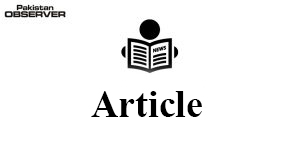Iqbal Khan
INDIA’S 5 August 2019 folly of stripping India-occupied Jammu and Kashmir (IOJ&K) of its special status has become a proverbial ‘bone in the throat’ for Indian Prime Minster Narendra Modi and his hawkish, or say, foolhardy Home Minster and National Security Advisor. At the time of initiation of this rash act it was envisaged by India that: the emanating fissures would be under control in 2-3 weeks; an internationally accepted new normal would appear; the territories would be easily annexed; and the people subjugated for ever. India thought revocation of Articles 370 & 35 of its Constitution would just be a child’s play. Nothing of that sort was to happen. Fallout of this stupidity continue to haunt Indian leadership. Latest effect was that much awaited signing of a high profile economic partnership agreement between the European Union (EU) and India could not materialize during, July 15, Brussels Summit. Two sides are nowhere close to the Free Trade Agreement on which talks began in 2007. The issue of trade is of vital importance to India-EU relationship as the EU is India’s largest trade partner, even after Brexit. The EU is also the largest source for foreign investment to India, at over $91 billion. However, “India represents only about 2% of EU external trade”.
As another strategic fallout of revocation of Articles 370& 35A, India and China have been locked in a military stand-off in eastern Ladakh since early May. India’s ongoing border tension with China featured in the talks, with Modi briefing his EU counterparts. Prefacing his remarks by saying EU and China’s relationship is “complex”, President of European Council Charles Michel said, “Prime Minister Modi had the occasion also to inform us about the latest developments regarding this incident with China and we support all the efforts in order to maintain a channel of dialogue in order to find peaceful solutions”. Modi was on a hot plate when Charles Michel said in an answer to a question during the presser that the EU had raised the topic of the protests against the Citizenship (Amendment) Act with the Indian Prime Minister. “In the EU Parliament, it was an important topic in the last few months. We trust the Indian institutions. We understand that the Supreme Court will have a role to play in order to assess this legislation,” he said. Suhasini Haidar reported for The Hindu that “European Union leadership voices concern over J&K (Jammu & Kashmir), CAA (Citizenship Amendment Act)”. According to Vikas Swarup, Secretary (West) in the Ministry of External Affairs, “Relations with China did come up and the current situation was discussed by Prime Minister Modi.” He added there were also discussions on Pakistan and also on the reservations the EU has in terms of human rights concerns that it had raised before with regard to Kashmir and the CAA.
India has had a fraught relationship with the people of Jammu and Kashmir for decades. Although Home Minister Amit Shah’s announcement in Parliament on August 05, 2019 about annexation of India-occupied J&K came as a surprise to most Indians, it had taken the government a lot of preparation to arrive at the decision. Hindu nationalist BJP had long opposed Article 370 and revoking it was in the party’s 2019 election manifesto. After returning to power with a massive mandate in the April-May general election, the government lost no time in acting on its nefarious plan.Articles 370 and 35-A through a short-cut method and state was bifurcated into two Union territories. This internationalised the Kashmir issue. Unprecedented and never ending curfew became a new normal. All international human rights watchdogs started shaming India. Soon after Indian Home Minister announced in the Lower House of Indian Parliament that India would conquer the territories comprising Azad Jammu and Kashmir and Aksai Chin, whereby threatening use of force against Pakistan and China. This being a clear violation of the UN Charter, the matter went to the UN Security Council, and has since been discussed, a number of times, behind closed doors.
P Chidambaram, a senior leader in the opposition Congress Party had described the decision as a “catastrophic step” and warned in Parliament that it could have serious consequences. “You may think you have scored a victory, but you are wrong and history will prove you to be wrong. Future generations will realise what a grave mistake this House is making today,” he said. According to the Constitution, Article 370 could only be modified with the agreement of the “state government”. But there hadn’t been much of a state government in Jammu and Kashmir for over a year on 5 August. In June 2018, India had imposed federal rule after the government of the then Chief Minister, Mehbooba Mufti, was reduced to a minority. This was mischievously interpreted that the federal government only had to seek the consent of the governor, for imposition of his own rule; conflict of interest inherent in this methodology was purposefully ignored. An RSS stooge was the State Governor on August 05, 2019.
According to India’s prominent constitutional expert, AG Noorani, it was “an illegal decision, akin to committing fraud.” Opposition political parties could launch a legal challenge but Kashmir is an emotive issue with many Indians, and most parties would be wary of opposing the move lest they be branded anti-India. That could leave any challenge up to individuals or activists. Strategically, India lost Kashmir on 5 August 2019—by shattering the confidence of Kashmiris. And, it is poised to lose the territorial control as well, It’s only a matter of time.
—The writer is a freelance columnist based in Islamabad.










